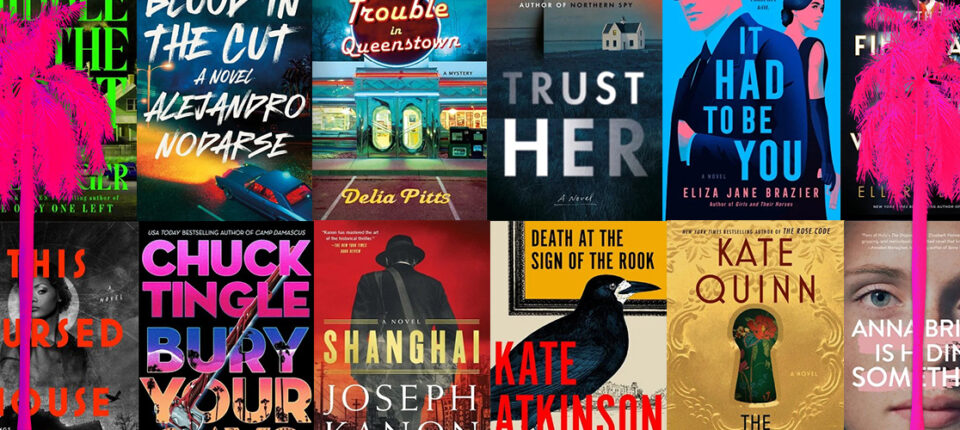Summer is here! Or, at least, pool season is officially starting (it’s been summer already for many of us working remotely). There are, of course, a gazillion good books coming out over the summer, and to attempt to highlight them all is a quixotic and never-ending quest. Thanks to all the readers who make the quest always feel worth it! And may we all be blessed with a goal that can never end, for that way, we will never be bored.
___________________________________
JUNE
___________________________________
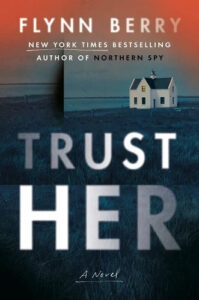
Flynn Berry, Trust Her
(Viking)
Sisters Tessa and Marian Daly continue to reckon with their pasts in Trust Her, from Northern Spy author Flynn Berry. Having relocated to Dublin, the women try to start their lives over, but the IRA soon catches up and presses them into a risky job with a former handler from MI5. It’s another heady tale of family and espionage. –DM
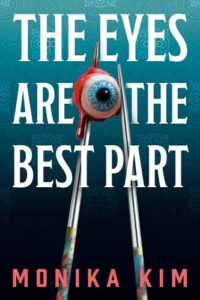
Monika Kim, The Eyes are the Best Part
(Erewhon Books)
In this darkly funny psychological horror, a college student must protect her mother and her sister from her mother’s creepy new boyfriend. Like all the other men in their lives, he’s trying to reduce their humanness into stereotypes about doll-like, submissive Asian women, and Kim’s protagonist is certainly not going to let him get away with it. She’s also spending a lot of time having intense dreams about eating bright blue eyes, standing over her sleeping enemies and fantasizing their demise, and generally losing touch with reality in a way that pays plenty of dividends by the novel’s end. –MO
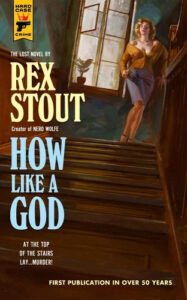
Rex Stout, How Like a God
(Hard Case Crime)
I never thought I’d say this in the year of our lord 2024 but there’s a Rex Stout novel coming out! Unpublished for fifty years, this is a psychological thriller from Stout’s early career. But it has the traces of Stout’s beloved Nero Wolfe series: it begins in a NYC brownstone, with a man climbing the staircase, holding a gun. –OR
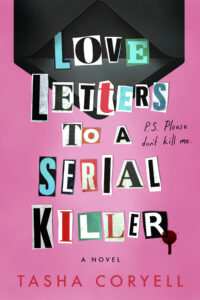
Tasha Coryell, Love Letters to a Serial Killer
(Berkley)
Would you strike up a romance with a potential murderer if he took your book recommendations? In this knowing critique of true crime culture and modern love, a woman begins a romance with a suspected serial killer and becomes obsessed with finding out the truth about her new paramour. I sped through this novel and related to many of its uncomfortable truths about the misogyny within ordinary relationships that makes dating a man accused of horrible crimes who treats you well seem…justifiable? Or at least, rather understandable…–MO
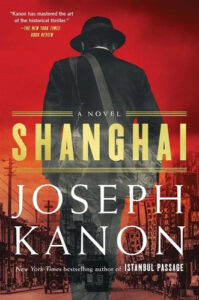
Joseph Kanon, Shanghai
(Scribner)
Jewish refugees fleeing Nazi Europe settle in Shanghai in Kanon’s latest novel, a deeply engrossing tale of corruption, violence, and doomed love. The story begins on the first class decks of an ocean liner but soon runs headlong into the city’s warring gambling operations. Kanon always situates his political clashes and spy games in a fully realized human drama. Shanghai proves one of his most powerful stories to date. –DM
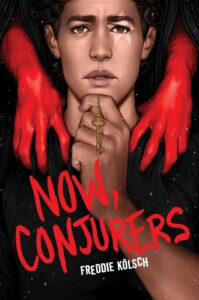
Freddie Kölsch, Now, Conjurers
(Union Square)
New voice Freddie Kolsch has written a queer horror novel for the ages, in which a charismatic quarterback’s failed quest for absolution is the catalyst for an epic confrontation between his coven and his killer. Not to be a pest, but you must read this book. No excuses. Now you must be wondering, why does every sentence in this blurb begin with an “n”? No cheating—you’ll have to pick up the book to find out yourself. –MO
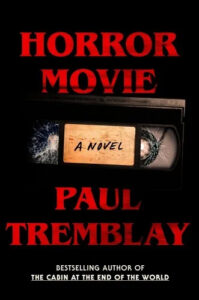
Paul Tremblay, Horror Movie
(William Morrow)
The “books about cursed productions” trend continues, as horror maestro Paul Tremblay takes us onto the set of the shot-for-remake of a legendary cult classic that never made it to the screen. Horror Movie is narrated by the actor who played the monstrous object of derision known as “The Thin Kid” in the first production, and has agreed to reprise the role in the remake. We’re not sure if we can trust his recollections, but his disturbing account provides plenty of fodder to condemn both the original film and the remake. –MO
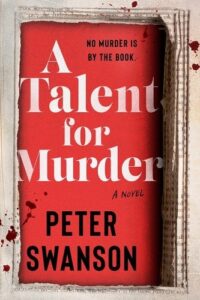
Peter Swanson, A Talent for Murder
(William Morrow)
Swanson always delivers perfectly calibrated suspense alongside the thrills of a truly clever mystery. In his newest, A Talent for Murder, an archival librarian begins to suspect the man she married may be carrying out a series of murders around the country. Her unique skills, along with some help from an old grad school friend, soon throw her deep into an investigation. Swanson drives the story to a smart conclusion that will keep readers guessing to the end. –DM
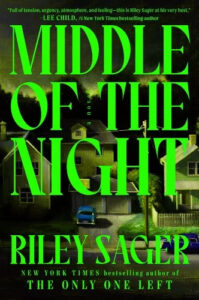
Riley Sager, Middle of the Night
(Dutton)
I love Riley Sager, but everybody loves Riley Sager. And why not!? The man knows how to write a thriller! And this one is the electric, terrifying story about a man who decides to investigate what happened the night his best friend Billy vanished during a sleepover in his backyard, thirty years before. Goosebumps! I have goosebumps! –OR

Susie Orman Schnall, Anna Bright Is Hiding Something
(Sparkpress)
In this Silicon Valley-set thriller, Anna Bright is about to achieve her wildest dreams of success—as long as no one finds out that the biotech she’s shilling doesn’t exactly work as advertised. She just needs to outwit the board, tamp down internal dissension, and keep the journalists printing whatever she tells them. The story is obviously based on Elizabeth Holmes’ Theranos, but there’s a wider aim to Schnall’s vision, as she spins her inspiration into a visceral takedown of misogyny and double standards in the tech industry. –MO
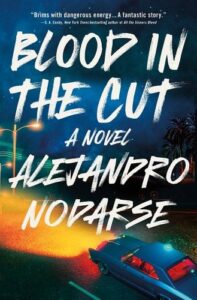
Alejandro Nodarse, Blood in the Cut
(Flatiron)
In Nodarse’s assured debut, a young man at a crossroads tries to save his family’s butcher shop against pressures from all sides. Nodarse conjures up a captivating vision of life in Miami, with shady operators around every corner and family legacies in peril. Nodarse is a writer of great promise, and readers will be clamoring for a follow-up.–DM

Leslie Stephens, You’re Safe Here
(Gallery/Scout Press)
In this futuristic wellness thriller, a secretive Silicon Valley company has just launched the first wave of wellness “pods”—self-sustaining bubbles in which the wealthy and privileged can find inner peace while drifting along an ocean belt known for its stable weather and lack of storms. The pods are rumored to have major design flaws, and the two powerful figures at the center of the company are in a contest of will to determine who bears the blame for any disasters. One of the company’s best workers is drawn into the intrigue brewing between founders as she desperately races to save her fiancee, encased in one of the pods, from a looming storm threatening the pod’s integrity. Chockfull of warnings about tech gone awry (and also lots of tech that I would frankly love to have in my life). –MO
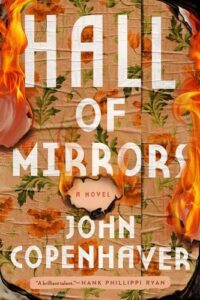
John Copenhaver, Hall of Mirrors
(Pegasus)
In the midst of the Lavender Scare, a mystery novelist is murdered, killed in an arson attack on the apartment he shared with his lover and writing partner. The grieving writer is hell-bent on finding the cause of his partner’s death, but Copenhaver’s teenage sleuths-turned-lovers from The Savage Kind are alternately helping and hindering in the investigation, as they continue to pursue their old nemesis, now wreaking havoc in the State Department. An excellent continuation of Copenhaver’s series, richly detailed and with convincingly realized characterizations. –MO
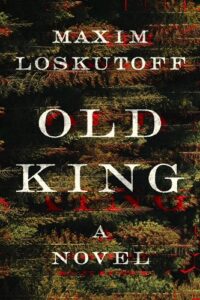
Maxim Loskutoff, Old King
(W.W. Norton)
Maxim Loskutoff’s Old King is as majestic and foreboding as the old growth forest featured so heavily in its pages. The setting is Lincoln, Montana, where, in the wake of America’s bicentennial, an angry recluse named Ted Kazinski (the Unabomber) is preparing to spread chaos through the US mail system, convinced that his acts of random violence will spark an uprising against the era of the machines. Loskutoff spends only small sections of the book immersed in Kazinski’s disturbing perspective, peopling the rest of his pages with a well-sketched cast of characters strongly divided on a host of questions: do they protect the forest or exploit it? Is modernity an evil? Is it inevitable? And can it be stopped? –MO
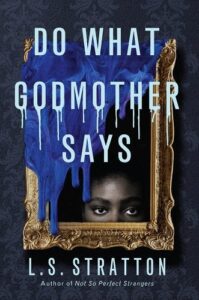
L.S. Stratton, Do What Godmother Says
(Union Square)
L.S. Stratton’s new gothic thriller is divided between the Harlem Renaissance past and a writer in D.C.’s present. In the past, a young painter is taken under the wing of a mysterious socialite; her new hopes for the security to pursue artistic freedom are quickly dashed as she learns how controlling her new patron can be. In the present, a journalist comes into possession of a valuable painting, only to find herself beset by collectors who seem ready to engage in unscrupulous methods in order to get their hands on the piece of art. Do What Godmother Says is both a prescient critique of artistic appropriation and a darn good mystery—in short, an immensely satisfying read. –MO
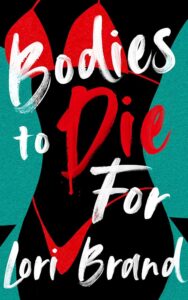
Lori Brand, Bodies to Die For
(Blackstone)
I devoured this novel faster than the winner of a body-building contest drinks water after their win (a joke you’ll totally get if you dive into this searing critique of diet culture and the pressures of professional body-building). Lori Brand has had a long career in fitness that has led to her embracing strength, not weight-loss, and I’m pretty sure this book is the most physically—and emotionally—healthy thriller I’ve read in some time. I may even sign up for a boxing class now… –MO
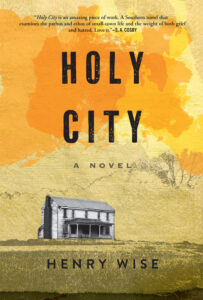
Henry Wise, Holy City
(Atlantic Monthly Press)
Look out for Holy City, a debut novel of immense power. When a Black man is killed in a small Southern Virginia town, and an innocent man is arrested for the crime, two people who prefer to work alone find themselves working together to solve it. Bennico is a private detective who has been hired by the local Black community, after the sheriff’s department won’t do anything to investigate. Will is the deputy sheriff, and is angry that he’s told to stand down, especially because the crime is highly personal; the murdered man is Tom Janders, a Black neighbor and Will’s old friend, who once protected Will and suffered because of it.—OR
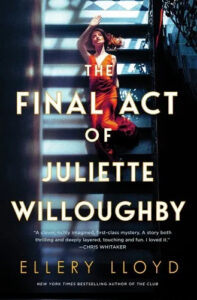
Ellery Lloyd, The Final Act of Juliette Willoughby
(Harper)
Ellery Lloyd is the pen name of a married duo who’ve been cowriting some of the most vicious and insightful critiques of modern living I’ve ever read. Now, they’ve turned to historical fiction to explore class, colonialism, and misogyny in the pre-war art world. Two art students come across a lost masterpiece of surrealism, but twists and turns abound when the painting disappears, only to resurface decades later in connection with a violent killing. –MO
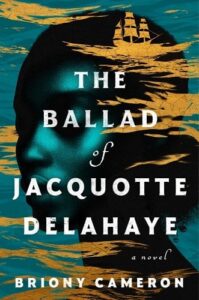
Briony Cameron, The Ballad of Jacquotte Delahaye
(Atria)
This is a fascinating take on a rumored real-life figure, the swashbuckling Jacquotte Delahaye, but one which takes plenty of narrative license to fill out the gaps in her amazing tale. Jacquotte begins the novel as a shipbuilder, but through no fault of her own, soon becomes an outlaw, and must take to the high seas to preserve her own life and those of her companions. She quickly grows her crew through enlisting some nontraditional sailors, and finds herself on a path towards safety and autonomy—if she can keep herself from a showdown with her nemesis, of course. –MO
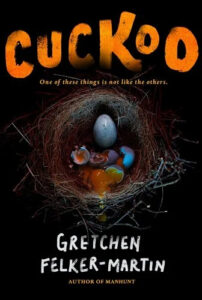
Gretchen Felker-Martin, Cuckoo
(Tor Nightfire)
Gretchen Felker-Martin forever won my heart with her splattterpunk horror novel Manhunt, and now she’s done it again with a queer conversion camp thriller that is truly terrifying to read. Felker-Martin writes with sensitivity and righteous fury about the many torments the teenage characters are forced to endure in the name of heteronormativity, and the stakes are ever higher as the kids begin to realize that even those who leave the camp are no longer themselves—and many will not leave at all. Felker-Martin excels at creeping out readers with her off-kilter descriptions and gory details, and I wouldn’t open this one up while eating. Also quick shoutout to one of the only authors out there with consistently sympathetic fat characters who also get to have sex. Thank you, Gretchen! –MO

E. K. Sathue, Youthjuice
(Hell’s Hundred)
In the first release from Hell’s Hundred, the new horror imprint from Soho Press, E. K. Sathue’s main character earns all the press release’s comparisons to Patrick Bateman. Just a run-of-the-mill sociopath at first, the narrator soon gets sucked into the murderous enterprise of a wellness company with an incredibly suspicious number of missing former interns and a CEO who appears to bathe in blood. This book makes me glad that I interned at an archive…Although I did go on a serum buying spree about half-way through reading it. –MO
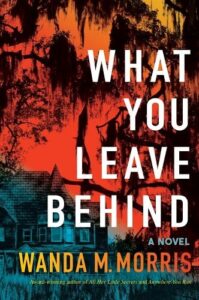
Wanda Morris, What You Leave Behind
(William Morrow)
Wanda Morris is back with an intricate real-estate thriller informed by real life events. What You Leave Behind follows a lawyer who’s recently returned to her childhood home in Georgia to heal after heartbreak. Instead, she finds herself trying to discover the truth behind a Black landlord’s disappearance and the menacing new buyers of the property he’d long refused to sell. I’m a huge fan of Morris and the novel’s subject—land grabs—is one that’s perfect for her to demystify. –MO
___________________________________
JULY
___________________________________
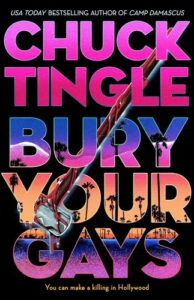
Chuck Tingle, Bury Your Gays
(Tor Nightfire)
Chuck Tingle may have made his name in steamy-yet-absurdist erotica, but Bury Your Gays, along with last year’s Camp Damascus, cements Tingle’s place as one of the best new novelists around, horror or otherwise. Showrunner Misha is giving a harsh directive from his studio overlords: either kill off his queer characters, or make them straight. When he refuses to do either, monstrous beings from Misha’s previous cinematic endeavors start confronting him in the flesh, and even worse: they’re threatening his loved ones. This is quite possibly the best spoof of Hollywood since Get Smart. And three cheers for a book with ace representation! –MO
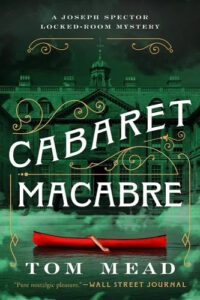
Tom Mead, Cabaret Macabre
(Mysterious Press)
If you’re not reading Tom Mead, what are you doing with your life? His delightful puzzle-mysteries and riddling locked-room plots are some of the best today. This delightful novel brings back his ingenious sleuth, the retired stage magician Joseph Spector. Someone is trying to kill Victor Silvius, a man from a wealthy family—now inmate at a private santorum in the English countryside. But that’s not all. While Spector is looking into Silvius’s case, he finds two mysterious cases: a body is found in the middle of a frozen lake, and a rifle has been fired from behind a closed window, killing the man on the other side without breaking the glass. Lock me up, because I’m going insane with anticipation.–OR
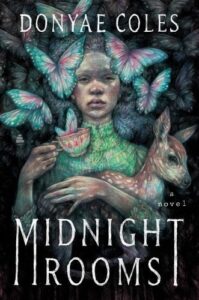
Donyae Coles, Midnight Rooms
(Amistad)
Never. Eat. What. The. Fairies. Give. You. Especially if it’s as disgusting as what’s consumed at the wedding feast in this atmospheric gothic (complete with strong folk horror elements). Donyae Coles’ plucky heroine is surprised to receive a later-in-life proposal from a mysterious gentleman. Their connection is genuine, but his family is off-putting, his manor house is crumbling, and for some reason, he keeps getting her drunk on honey wine while feeding her bloody meat and little cakes. What does he want, and what will she have to sacrifice to give it to him? –MO
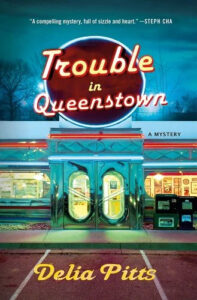
Delia Pitts, Trouble in Queenstown
(Minotaur)
Delia Pitts has a new series!!! And it’s awesome. Evander “Vandy” Myrick is an ex-cop-turned-PI who is trying to rebuild her life in her Jersey hometown after a series of personal and professional disasters. Her new case threatens her search for peace, after what seemed like a simple assignment to find out if a spouse is cheating becomes a murder investigation. –MO
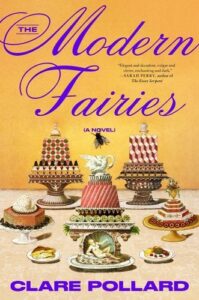
Clare Pollard, The Modern Fairies
(Avid Reader Press)
While debatably gothic, this novel set in 17th century ancien regime France is most certainly suited to the damp—after all, it was an era long before dehumidifiers (of which I now possess four). The Modern Fairies features the great historical salons of Paris, in which literary luminaries mingled with the demimonde and mixed witty repartee with inventive storytelling. Pollard’s characters are reinventing their nation’s traditional stories and creating the modern fairy tale, even as the details of their lives show the the rot of French society before the Revolution. –MO
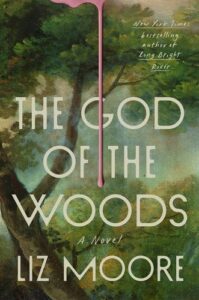
Liz Moore, The God of the Woods
(Riverhead)
Liz Moore’s The God of the Woods reminds me a bit of Picnic at Hanging Rock in the best way; it’s the story of a teenager who vanishes from her Adirondack summer camp in August 1975, and the frantic and foreboding search that follows. See, he girl who disappears, Barbara Ban Laar, isn’t simply a camper; she’s the daughter of the owners of the camp. And she’s the second person in her family to disappear in this fashion. –OR
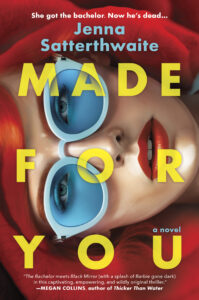
Jenna Satterthwaite, Made For You
(Mira)
Jenna Satterthwaite’s novel is a cutting and creative take on reality television and artificial personhood. Her heroine is the first “synth” to compete on a reality dating show, and only the third to exist publicly in the world. Her romance is fairy-tale perfection, but her marriage is decidedly less so, and when the husband she worked so hard to win goes missing, suspicion falls immediately on his robotic partner. Will she be able to prove her own innocence, and will the world finally accept her autonomy and sense of self? –MO
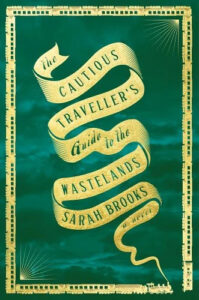
Sarah Brooks, The Cautious Traveller’s Guide to the Wastelands
(Flatiron)
This book is steampunk perfection! The Cautious Traveller’s Guide to the Wastelands takes place on an enormous train barreling through a landscape known as the “Wastelands” on its way from Beijing to Moscow at the turn of the 20th century. Outside the train, strange creatures with knowing eyes and too many mouths regard the iron beast and its fearful passengers. Inside the train, a powerful company tries to preserve order and cover up past mistakes as various travelers try to discover the truth behind what happened on the disastrous previous journey. Brooks brings a Mieville-esque mentality to her novel, with some terrifying creepy-crawlies and an even more terrifying capitalist conglomerate. –MO
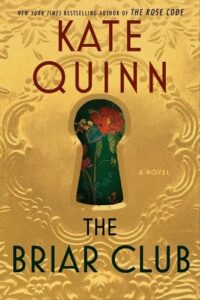
Kate Quinn, The Briar Club
(William Morrow)
Kate Quinn is the reigning queen of historical fiction, and her latest continues to uphold her reputation for grasping the complexities, nuances, and dynamism of the past. In The Briar Club, set in 1950s-era DC, an unorthodox community develops in a women’s boardinghouse when a glamorous and mysterious new resident brings everyone together. This book is what I wish Amelie had been. Also there are recipes. Really, this book is perfect.–MO
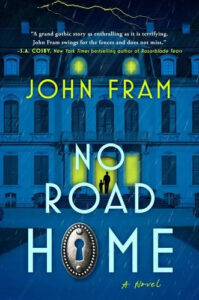
John Fram, No Road Home
(Atria)
A wealthy preacher’s compound is the setting for this gothic parable from the author of The Bright Lands. The narrator of No Road Home, newly wedded to the beautiful scion of a megachurch pastor, is visiting his wife’s family for the first time when a storm closes them off from the rest of the world just as their patriarch is found dead. Even before the disturbing demise, Fram’s hero is already having second thoughts about the marriage: her relatives keep making snide remarks about his gender nonconforming son, it turns out his wife only married him to unlock her own inheritance, every family member appears to be keeping secrets, and someone’s been painting threatening messages warning of vengeance to come. Oh, and there’s also a ghost and some very disturbing paintings… –MO
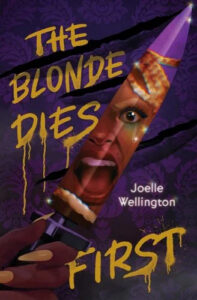
Joelle Wellington, The Blonde Dies First
(S&S)
I loved Joelle Wellington’s debut thriller with its epic party gone terribly wrong, and she continues to wreak gleeful havoc with traditional tropes in her new thriller. This one features an epic summer party interrupted by a demon hell-bent on picking off guests. –MO

Eli Cranor, Broiler
(Soho)
Cranor’s latest thriller examines intersecting lives at an Arkansas chicken plant, where an unwarranted firing sends violent ripples out into the world, bringing families to their knees. Cranor paints a vivid, devastating portrait of the cruelty surrounding an imbalanced system, all while maintaining a wicked level of tension that drives this powerful story forward. He is a writer at the top of his game. –DM
Mateo Askaripour, This Great Hemisphere
(Dutton)
In a world divided between the visible dominant population and the invisibles who serve them, a young invisible woman is shocked to discover her brother is not only alive, but now accused of murder. She has the skills to save him and the impulse to track down the real killer, but will the world around her listen to the truth or subvert reality to their own hierarchically based needs? I cannot wait to dive into this one and emerge blinking, hours later, questioning the notion of existence itself…–MO
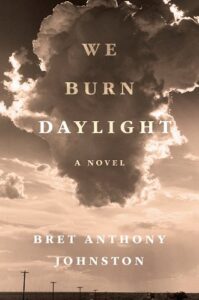
Bret Anthony Johnston, We Burn Daylight
(Random House)
That setting tells you straightaway what this one’s going to be about: the Branch Davidians, the Waco siege, and the ordinary lives caught up in a flash-point moment that will reverberate for a generation to come. We Burn Daylight uses the perspectives of two star-crossed lovers—the sheriff’s son and the unbelieving daughter of a cult member—to navigate the complexities of the showdown, for a moving and epic tale. I would expect no less from Johnston.–MO
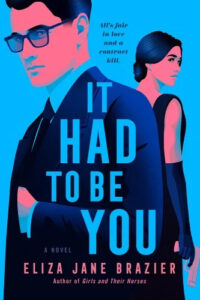
Eliza Jane Brazier, It Had To Be You
(Berkley)
Eliza Jane Brazier is quickly becoming a favorite, and the newest title from her has a perfect premise: two contract killers, one hired to kill the other, instead fall deeply in love. Who could resist? –MO
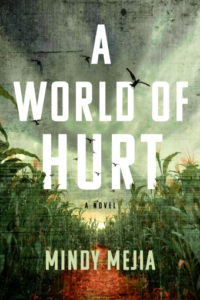
Mindy Mejia, A World of Hurt
(Atlantic Monthly Press)
Wait no longer! Mindy Mejia is back, finally, with a sequel to To Catch a Storm! DEA informant Kara Johnson is going undercover with a dangerous drug trafficking ring to find out who killed her girlfriend, and Iowa City police officer Max Summerlin is assigned to handle her. They each have secrets and they don’t get along, but they don’t have a lot of time to track down the criminals, so they had better figure something out.–OR

Emily Dunlay, Teddy
(Harper)
In this madcap tale of espionage and adventure, a Dallas debutante marries a foreign service worker and heads to mid-1960s Italy, determined to put her wild days behind her and finally Behave. Events conspire to foil her goals of proper deportment, and soon enough, she’s involved in a blackmail scheme, embassy hijinks, and the most daunting task of all: finding a couture dress that can fit her without needing to be tailored. Teddy is not just a fabulous historical novel—it’s a manifesto against the patriarchy, and a liberating experience of watching a woman free herself. –MO
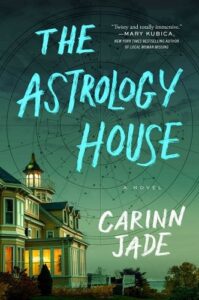
Carinn Jade, The Astrology House
Carinn Jade takes on the locked-room mystery and makes it her own in this psychological-thriller-cum-comedy-of-manners. A wealthy group of friends decamps to a remote house for an astrology-oriented getaway only to find their host has her own agenda for the weekend. This book will have you wondering about your own charts—and whether that house in Mercury Retrograde just might make you a murderer. –MO
___________________________________
AUGUST
___________________________________

Jessa Maxwell, I Need You To Read This
(Atria)
The new advice columnist for a major paper is psyched to have the job of her dreams, even if her predecessor was murdered, but she soon finds out she’s got more on her plate than solving the humdrum problems of the populace. She also needs to find out who’s been sending threatening letters to her office, and if they have anything to do with the previous columnist’s death—or her own dark past. Maxwell embodies the empathy of the advice giver well, while also crafting a propulsive narrative with plenty of twists and turns. –MO
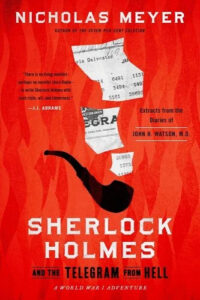
Nicholas Meyer, Sherlock Holmes and the Telegram From Hell
(Mysterious Press)
As an ardent fan of Meyer’s groundbreaking original Sherlock Holmes novel The Seven-per-Cent Solution, I am so excited for this new one. It takes place during World War I, with Watson back to working as a doctor, tending wounded soldiers when his old friend Sherlock Holmes arrives and asks for his help carrying out a mission straight from the British secret service, sending them to American, tracking a mysterious coded telegram sent from Berlin to Mexico. Jolly good fun! –OR
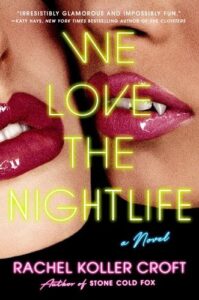
Rachel Koller Croft, We Love the Nightlife
(Berkley)
What’s better than a psychological thriller about vampires? A psychological thriller about disco vampires! In Rachel Koller Croft’s sophomore novel, Nicola and Amber have been vampirical companions since Nicola first spotted Amber on the dance floor. Decades later, Amber wants to move on, and Nicola tries to keep her interested by proposing that the two open a new club together. Koller Cr0ft is at her sly, sardonic best in this suspenseful tale of friendships gone sour. –MO
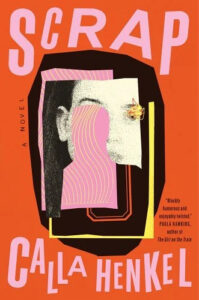
Calla Henkel, Scrap
(Overlook)
Scrap here refers to scrapbooking—Henkel’s narrator is a failed artist who’s just been dumped and needs a new job fast, so she feels lucky when a wealthy art patron hires her to take decades worth of mementos and turn them into high-brow scrapbooks. When her employer dies suddenly before the books can be completed, she’s thrust into a web of intrigue and vengeance that will either reward her enormously or crush her completely. –MO
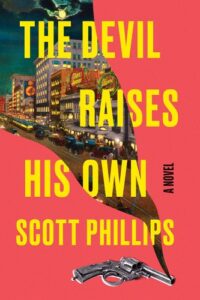
Scott Phillips, The Devil Raises His Own
(Soho Crime)
This novel is so damn charming, in spite of (or perhaps because of) its salacious historical setting—early Hollywood’s burgeoning scene of blue movies. In The Devil Raises His Own, the denizens of Los Angeles just before WWI intersect and part ways in a thousand different combinations for a kaleidoscopic portrait of an entire city at the precipice of extraordinary cultural significance. Phillips has crafted a picaresque tale of winners and losers, lovers and cheaters, suckers and con artists, rising starlets and drunken has-beens, dirty old men and even dirtier married women: in short, a truly American novel of epic proportions. –MO
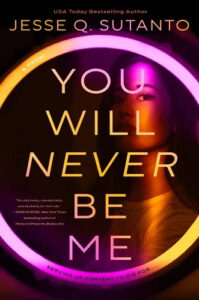
Jesse Q. Sutanto, You Will Never Be Me
(Berkley)
Everything that Jesse Q. Sutanto turns her hand to is gold, and You Will Never Be Me is no exception. In this vicious psychological thriller, two influencers face off against one another in a battle for the ages. Meredith and Aspen are friends-turned-bitter rivals, their laundry list of resentments eclipsing their once-powerful bond. When one goes missing, the other falls under suspicion, but there’s plenty of twists and turns before we find out what’s really going on. –MO
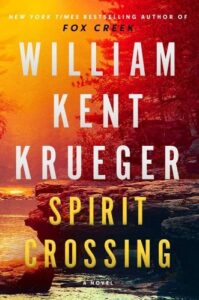
William Kent Krueger, Spirit Crossing
(Atria Books)
In the newest Cork O’Connor mystery, the investigation into a politician’s missing daughter and the death of a young Ojibwe woman intersect, throwing Cork together with the Lake Ojibwe Tribal Police in a story that exposes some of the region’s starkest divides and injustices. Krueger deals in powerful narratives with great skill. –DM
___________________________________
SEPTEMBER AND BEYOND
___________________________________
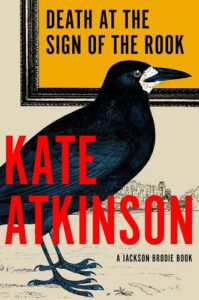
Kate Atkinson, Death at the Sign of the Rook
(Doubleday)
Yorkshire’s best ex-detective is finally back in this hotly-anticipated continuation of Kate Atkinson’s Jackson Brodie series. This time, he’s bored, with nothing but an art theft to work on… but it leads him down a dark and twisty path to Burton Makepeace, a dilapidated former estate that now hosts murder mystery weekends. Delightful! –OR
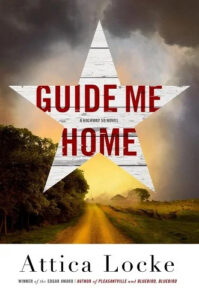
Attica Locke, Guide Me Home
(Mulholland)
In the final chapter of the Darren Matthews saga, the Texas Ranger is drawn into the investigation of a Black woman’s disappearance, with her white sorority sisters claiming she isn’t missing at all. As with all the installments of this powerful series, history and family legacies and class divisions get all tangled up to produce something distinctly and disturbingly American. Locke has produced a fitting conclusion for one of the era’s defining mystery characters. –DM
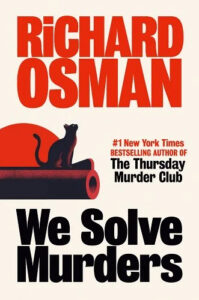
Richard Osman, We Solve Murders
(Pamela Dorman)
Am I said that Richard Osman is not publishing a fifth Thursday Murder Club this fall? Yes. Am so incredibly over the moon that he’s bringing us another indelible, incomparable sleuthing team? Yes. And they are former-investigator-cum-retiree Steve Wheeler and his private-security-working daughter-in-law Amy. I can’t wait to meet them. –OR
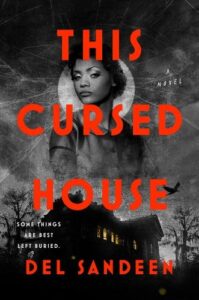
Del Sandeen, This Cursed House
(Berkley)
Jemma Barker is broke and newly single when a strange offer comes in: a lucrative position has opened up with a wealthy family on their Louisiana plantation, and Jemma needs to get out of Chicago, fast. It’s 1962 and the world is changing, but for the family on the plantation, things appear to be frozen in time, as the family is still stuck in the colorism that allows them to feel superior to the darker-skinned Jemma. Sandeen’s heroine soon learns that the family has summoned her for a very particular purpose: they are cursed, and they believe her to be the only one who can save them from future calamity.–MO
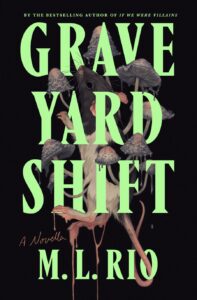
M.L. Rio, Graveyard Shift
(Flatiron)
M.L. Rio’s Graveyard Shift is a wonderfully eerie novella, reminiscent of the spooky, gothic tales of M.R. James. The premise is so good you’ll shiver: every night, the same five people walk by one another as they head home from their late shifts at their jobs, walking through the old cemetery in their old college town. But one night, they are shocked to stumble upon a freshly dug grave. And before they can continue on home, the gravedigger reappears. You shivering? I TOLD YOU!–OR
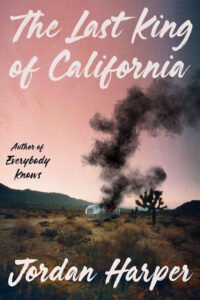
Jordan Harper, The Last King of California
(Mulholland)
Readers in the US will finally get a chance to read Harper’s sunburnt tragedy, which arrived first in Britain. In The Last King of California, Harper channels the best of Kem Nunn and delivers a story of family rivalries and warring bikers, all set deep in the California desert. Harper’s pacing is pitch perfect, and his noir sensibilities infuse the novel with dark poetry. –DM
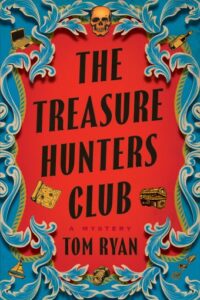
Tom Ryan, The Treasure Hunters Club
(Atlantic Monthly Press)
Tom Ryan’s delightful adventure story is an edge-of-your-seat, pirate-happy murder mystery, the kind of book you would hope for as a kid, and be thankful for, as a grown-up. –OR
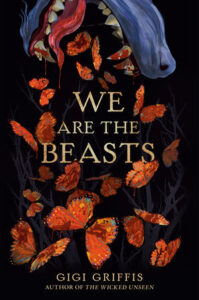
Gigi Griffis, We Are the Beasts
(Delacorte)
Gigi Griffis breathes new life and intrigue into the historical tale of the Beast of Gévaudan, the mythical monster blamed for a rural murder spree in Ancien Regime France, as two teen girls take advantage of the chaos to fake the deaths of their nearest and dearest and thus save them from more human terrors. Griffis has an eye for historical detail and a deft hand when it comes to plotting.–MO

